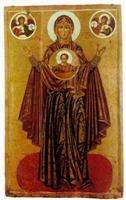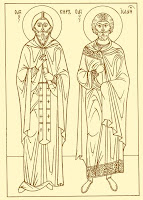
When an Orthodox Christian physician provides medical care to a pregnant woman, the physician finds two patients under his care, mother and child. By the efforts of the physician, may the health of both be improved and preserved.
A physician may encounter a woman who does not want her child or even recognize the fetus as a child. An Orthodox Christian physician must be careful not only to refuse to assist in an abortion, but must also be careful not to merely redirect the mother to another provider who will perform an abortion. If a stranger approaches an Orthodox Christian man and asks, "Will you kill a family member for me?," the Christian should not respond, "Of course, not! - but, I know a hitman who will. He'll do it quickly, effectively, and with as little danger to your other family members as possible." The Orthodox Christian should clearly refuse to commit murder and to aid a potential murderer in carrying out the evil scheme. The time when a scared and confused mother in a chaotic life-situation seeks an abortion may not be a good moment for the physician to abandon a patient by leaving her to an abortionist, although the patient can make a decision to abandon the physician and seek a secular abortionist to carry out her plans. Rather, an Orthodox Christian physician who encounters a woman desiring an abortion can aid a woman's rise out of her own delusion and egotism to realize that she has child (her own child) within her womb and that she is truly a mother, who is called to be a mother after the image of the Theotokos and all the nurturing mother-Saints who have brought forth children.
When caring for young women with unexpected and/or unwanted pregnancies, all who care should do so with great tenderness and love. Information regarding adoption and caring for the child in the context of the family and church can be discussed. Certainly, the physician can call upon a priest to speak with the mother if she is willing. Ultimately, a woman will exercise her will to choose what she will do. The physician, however, should clearly indicate that he is obliged to care for both patients, that abortion is simply the murder of an innocent child (even if the child's conception involved an act of violence), and that, while he will take no part in the murder of a child, he will help the woman in the process of bringing the child into life in the world.
While abortion is often seen as a political issue in our society, for Orthodox Christians it is a matter of expressing love to give life or murdering an innocent victim because of self-love (narcissism/egotism) and delusion. With love and prayer, the physician may be able to preserve the life of a baby and point the mother toward a healthier, spiritually nourishing life.
Selections from early Christian writings, a description of the development of a child in the womb, and other relevant resources can also be found on the Antiochian Archdiocese website.The Orthodox Christian approach to abortion is expressed in a brief submitted to the US Supreme Court (pdf).
The Office of Prayer and Supplication for the Victims of Abortion (pdf) is available on the Antiochian Archdiocese website.









